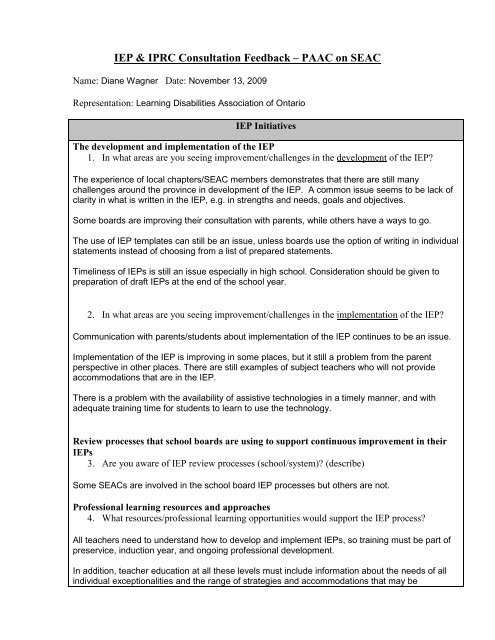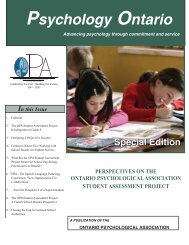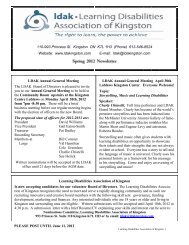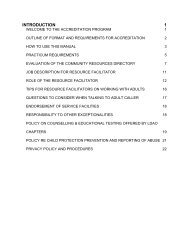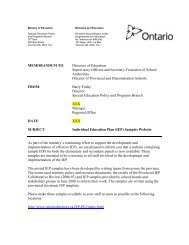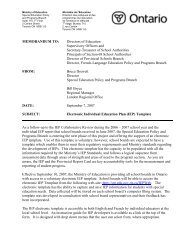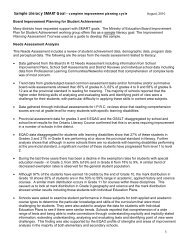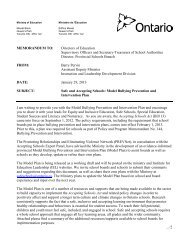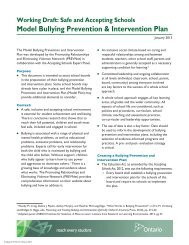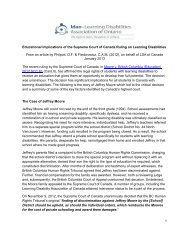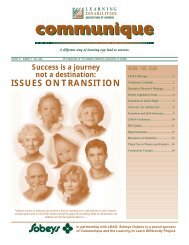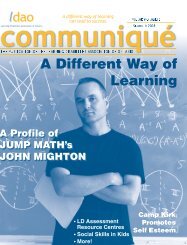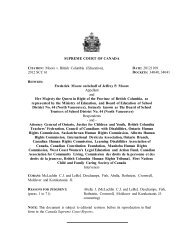LDAO Response to IEP & IPRC Consultation with PAAC on SEAC
LDAO Response to IEP & IPRC Consultation with PAAC on SEAC
LDAO Response to IEP & IPRC Consultation with PAAC on SEAC
Create successful ePaper yourself
Turn your PDF publications into a flip-book with our unique Google optimized e-Paper software.
<str<strong>on</strong>g>IEP</str<strong>on</strong>g> & <str<strong>on</strong>g>IPRC</str<strong>on</strong>g> <str<strong>on</strong>g>C<strong>on</strong>sultati<strong>on</strong></str<strong>on</strong>g> Feedback – <str<strong>on</strong>g>PAAC</str<strong>on</strong>g> <strong>on</strong> <strong>SEAC</strong><br />
Name: Diane Wagner Date: November 13, 2009<br />
Representati<strong>on</strong>: Learning Disabilities Associati<strong>on</strong> of Ontario<br />
<str<strong>on</strong>g>IEP</str<strong>on</strong>g> Initiatives<br />
The development and implementati<strong>on</strong> of the <str<strong>on</strong>g>IEP</str<strong>on</strong>g><br />
1. In what areas are you seeing improvement/challenges in the development of the <str<strong>on</strong>g>IEP</str<strong>on</strong>g>?<br />
The experience of local chapters/<strong>SEAC</strong> members dem<strong>on</strong>strates that there are still many<br />
challenges around the province in development of the <str<strong>on</strong>g>IEP</str<strong>on</strong>g>. A comm<strong>on</strong> issue seems <str<strong>on</strong>g>to</str<strong>on</strong>g> be lack of<br />
clarity in what is written in the <str<strong>on</strong>g>IEP</str<strong>on</strong>g>, e.g. in strengths and needs, goals and objectives.<br />
Some boards are improving their c<strong>on</strong>sultati<strong>on</strong> <str<strong>on</strong>g>with</str<strong>on</strong>g> parents, while others have a ways <str<strong>on</strong>g>to</str<strong>on</strong>g> go.<br />
The use of <str<strong>on</strong>g>IEP</str<strong>on</strong>g> templates can still be an issue, unless boards use the opti<strong>on</strong> of writing in individual<br />
statements instead of choosing from a list of prepared statements.<br />
Timeliness of <str<strong>on</strong>g>IEP</str<strong>on</strong>g>s is still an issue especially in high school. C<strong>on</strong>siderati<strong>on</strong> should be given <str<strong>on</strong>g>to</str<strong>on</strong>g><br />
preparati<strong>on</strong> of draft <str<strong>on</strong>g>IEP</str<strong>on</strong>g>s at the end of the school year.<br />
2. In what areas are you seeing improvement/challenges in the implementati<strong>on</strong> of the <str<strong>on</strong>g>IEP</str<strong>on</strong>g>?<br />
Communicati<strong>on</strong> <str<strong>on</strong>g>with</str<strong>on</strong>g> parents/students about implementati<strong>on</strong> of the <str<strong>on</strong>g>IEP</str<strong>on</strong>g> c<strong>on</strong>tinues <str<strong>on</strong>g>to</str<strong>on</strong>g> be an issue.<br />
Implementati<strong>on</strong> of the <str<strong>on</strong>g>IEP</str<strong>on</strong>g> is improving in some places, but it still a problem from the parent<br />
perspective in other places. There are still examples of subject teachers who will not provide<br />
accommodati<strong>on</strong>s that are in the <str<strong>on</strong>g>IEP</str<strong>on</strong>g>.<br />
There is a problem <str<strong>on</strong>g>with</str<strong>on</strong>g> the availability of assistive technologies in a timely manner, and <str<strong>on</strong>g>with</str<strong>on</strong>g><br />
adequate training time for students <str<strong>on</strong>g>to</str<strong>on</strong>g> learn <str<strong>on</strong>g>to</str<strong>on</strong>g> use the technology.<br />
Review processes that school boards are using <str<strong>on</strong>g>to</str<strong>on</strong>g> support c<strong>on</strong>tinuous improvement in their<br />
<str<strong>on</strong>g>IEP</str<strong>on</strong>g>s<br />
3. Are you aware of <str<strong>on</strong>g>IEP</str<strong>on</strong>g> review processes (school/system)? (describe)<br />
Some <strong>SEAC</strong>s are involved in the school board <str<strong>on</strong>g>IEP</str<strong>on</strong>g> processes but others are not.<br />
Professi<strong>on</strong>al learning resources and approaches<br />
4. What resources/professi<strong>on</strong>al learning opportunities would support the <str<strong>on</strong>g>IEP</str<strong>on</strong>g> process?<br />
All teachers need <str<strong>on</strong>g>to</str<strong>on</strong>g> understand how <str<strong>on</strong>g>to</str<strong>on</strong>g> develop and implement <str<strong>on</strong>g>IEP</str<strong>on</strong>g>s, so training must be part of<br />
preservice, inducti<strong>on</strong> year, and <strong>on</strong>going professi<strong>on</strong>al development.<br />
In additi<strong>on</strong>, teacher educati<strong>on</strong> at all these levels must include informati<strong>on</strong> about the needs of all<br />
individual excepti<strong>on</strong>alities and the range of strategies and accommodati<strong>on</strong>s that may be
appropriate for these excepti<strong>on</strong>alities.<br />
Learning for All is very useful but insufficient <str<strong>on</strong>g>to</str<strong>on</strong>g> understand individual excepti<strong>on</strong>alities.<br />
Parent and older student involvement<br />
5. Describe how parents/students should be effectively involved in the <str<strong>on</strong>g>IEP</str<strong>on</strong>g> process?<br />
Parents and students need <str<strong>on</strong>g>to</str<strong>on</strong>g> understand the <str<strong>on</strong>g>IEP</str<strong>on</strong>g> process first. Yearly informati<strong>on</strong> sessi<strong>on</strong>s have<br />
been recommended, and teachers could refer parents/students <str<strong>on</strong>g>to</str<strong>on</strong>g> the <str<strong>on</strong>g>IEP</str<strong>on</strong>g> 101 for Parents and<br />
Students <strong>on</strong>line workshop.<br />
Parent and student input should be sought out and welcomed before the <str<strong>on</strong>g>IEP</str<strong>on</strong>g> is developed, even<br />
before a draft is created. Teachers should be prepared <str<strong>on</strong>g>to</str<strong>on</strong>g> explain any items in the <str<strong>on</strong>g>IEP</str<strong>on</strong>g>.<br />
There must be room for parent/student comments <strong>on</strong> the <str<strong>on</strong>g>IEP</str<strong>on</strong>g> form.<br />
A dispute mechanism must be available when parents/students and teachers do not agree <strong>on</strong> the<br />
c<strong>on</strong>tent or implementati<strong>on</strong> of the <str<strong>on</strong>g>IEP</str<strong>on</strong>g>.<br />
Overall<br />
6. What do you need in your role in <str<strong>on</strong>g>PAAC</str<strong>on</strong>g> <strong>on</strong> <strong>SEAC</strong> <str<strong>on</strong>g>to</str<strong>on</strong>g> support more effective <str<strong>on</strong>g>IEP</str<strong>on</strong>g>s in any of<br />
these areas?<br />
• Development<br />
• Implementati<strong>on</strong><br />
• Review processes<br />
• Resources/Professi<strong>on</strong>al Learning<br />
• Parent/student involvement<br />
<str<strong>on</strong>g>PAAC</str<strong>on</strong>g> <strong>on</strong> <strong>SEAC</strong> should be c<strong>on</strong>sulted about any proposed changes <str<strong>on</strong>g>to</str<strong>on</strong>g> <str<strong>on</strong>g>IEP</str<strong>on</strong>g> processes, and the<br />
development of professi<strong>on</strong>al development <str<strong>on</strong>g>to</str<strong>on</strong>g>ols.<br />
<str<strong>on</strong>g>PAAC</str<strong>on</strong>g> <strong>on</strong> <strong>SEAC</strong> is uniquely placed <str<strong>on</strong>g>to</str<strong>on</strong>g> support parent/student involvement through the <strong>SEAC</strong><br />
members we support.<br />
Other<br />
There is <strong>on</strong>e big problem in the structure of the <str<strong>on</strong>g>IEP</str<strong>on</strong>g>:<br />
Students who need instructi<strong>on</strong> in basic academic skills but are otherwise working <strong>on</strong> grade level<br />
curriculum expectati<strong>on</strong>s, do not have a place <strong>on</strong> the <str<strong>on</strong>g>IEP</str<strong>on</strong>g> <str<strong>on</strong>g>to</str<strong>on</strong>g> set measurable goals and m<strong>on</strong>i<str<strong>on</strong>g>to</str<strong>on</strong>g>r<br />
progress <str<strong>on</strong>g>to</str<strong>on</strong>g>ward those goals. In such situati<strong>on</strong>s the basic academic skills could be c<strong>on</strong>sidered<br />
Alternative Skills Areas for the purposes of the <str<strong>on</strong>g>IEP</str<strong>on</strong>g>, but this is not a comm<strong>on</strong> practice.<br />
<str<strong>on</strong>g>LDAO</str<strong>on</strong>g> recommends that the Ministry of Educati<strong>on</strong> promote this use of Alternative Skill Areas <str<strong>on</strong>g>to</str<strong>on</strong>g><br />
ensure m<strong>on</strong>i<str<strong>on</strong>g>to</str<strong>on</strong>g>ring of student progress in remedial academic skills.
<str<strong>on</strong>g>IEP</str<strong>on</strong>g> & <str<strong>on</strong>g>IPRC</str<strong>on</strong>g> <str<strong>on</strong>g>C<strong>on</strong>sultati<strong>on</strong></str<strong>on</strong>g> Feedback<br />
<str<strong>on</strong>g>IPRC</str<strong>on</strong>g>/<str<strong>on</strong>g>IEP</str<strong>on</strong>g> Documentati<strong>on</strong><br />
1. How should documents be retained (where, how l<strong>on</strong>g) that are c<strong>on</strong>sidered by <str<strong>on</strong>g>IPRC</str<strong>on</strong>g>s? What<br />
are your reas<strong>on</strong>s for suggesting these practices?<br />
Parents need <str<strong>on</strong>g>to</str<strong>on</strong>g> be asked what assessment reports they wish <str<strong>on</strong>g>to</str<strong>on</strong>g> have s<str<strong>on</strong>g>to</str<strong>on</strong>g>red in their child’s OSR,<br />
where teachers will have access. Otherwise there should be a file in the Student Services or other<br />
professi<strong>on</strong>al services office that can <strong>on</strong>ly be accessed <str<strong>on</strong>g>with</str<strong>on</strong>g> the permissi<strong>on</strong> of the parent (or 16+<br />
student), except by the professi<strong>on</strong>al who did the assessment.<br />
Parents need <str<strong>on</strong>g>to</str<strong>on</strong>g> be <str<strong>on</strong>g>to</str<strong>on</strong>g>ld that they can view their child’s OSR from time <str<strong>on</strong>g>to</str<strong>on</strong>g> time <str<strong>on</strong>g>to</str<strong>on</strong>g> make sure that<br />
materials are still relevant <str<strong>on</strong>g>to</str<strong>on</strong>g> their child’s educati<strong>on</strong>al needs.<br />
2. To what extent is OSR access an issue <str<strong>on</strong>g>to</str<strong>on</strong>g> parents? What are the issues (if any)?<br />
Many parents are not aware that they can have access <str<strong>on</strong>g>to</str<strong>on</strong>g> the OSR or that there is a process for<br />
requesting removal of materials that they do not c<strong>on</strong>sider beneficial <str<strong>on</strong>g>to</str<strong>on</strong>g> the educati<strong>on</strong> of their child.<br />
3. In what circumstances (if any bey<strong>on</strong>d current requirements) would written reas<strong>on</strong>s for <str<strong>on</strong>g>IPRC</str<strong>on</strong>g><br />
decisi<strong>on</strong>s be helpful?<br />
Written reas<strong>on</strong>s for <str<strong>on</strong>g>IPRC</str<strong>on</strong>g> decisi<strong>on</strong>s would be very helpful for c<strong>on</strong>siderati<strong>on</strong> at <str<strong>on</strong>g>IPRC</str<strong>on</strong>g> Review<br />
meetings, in order <str<strong>on</strong>g>to</str<strong>on</strong>g> discuss any changes that may require rec<strong>on</strong>siderati<strong>on</strong> of <str<strong>on</strong>g>IPRC</str<strong>on</strong>g> decisi<strong>on</strong>s.<br />
Written reas<strong>on</strong>s for <str<strong>on</strong>g>IPRC</str<strong>on</strong>g> decisi<strong>on</strong>s could facilitate discussi<strong>on</strong>s at a sec<strong>on</strong>d meeting of the <str<strong>on</strong>g>IPRC</str<strong>on</strong>g><br />
when the parent does not agree <str<strong>on</strong>g>with</str<strong>on</strong>g> the decisi<strong>on</strong>(s).<br />
Written reas<strong>on</strong>s for <str<strong>on</strong>g>IPRC</str<strong>on</strong>g> decisi<strong>on</strong>s should give the rati<strong>on</strong>ale for recommendati<strong>on</strong>s about supports<br />
and services (see below).<br />
4. Should <str<strong>on</strong>g>IPRC</str<strong>on</strong>g> Statement of Decisi<strong>on</strong>s list supports and services in their reas<strong>on</strong>s for special<br />
class placements? What are your reas<strong>on</strong>s for suggesting this practice?<br />
Decisi<strong>on</strong>s about special class placement should be made <strong>on</strong> the basis of the supports and<br />
services that would be available in the placement. Parents make decisi<strong>on</strong>s about accepting<br />
placements based <strong>on</strong> this informati<strong>on</strong>. They need <str<strong>on</strong>g>to</str<strong>on</strong>g> be assured that these supports and services<br />
will indeed be in place.<br />
5. What informati<strong>on</strong> should schools seek from parents <str<strong>on</strong>g>to</str<strong>on</strong>g> improve the quality of <str<strong>on</strong>g>IPRC</str<strong>on</strong>g><br />
decisi<strong>on</strong>s and <str<strong>on</strong>g>IEP</str<strong>on</strong>g>s?<br />
• child's talents, interests, and strengths<br />
• successful strategies at home that may also work at school
• what the child finds rewarding and motivating<br />
• communicati<strong>on</strong>, social, and problem-solving skills<br />
• learning style, self-c<strong>on</strong>cept, learning difficulties<br />
• relevant assessments<br />
Other<br />
Please use this space <str<strong>on</strong>g>to</str<strong>on</strong>g> provide additi<strong>on</strong>al comments or thoughts not captured above<br />
Documentati<strong>on</strong> is useful when it c<strong>on</strong>veys and records informati<strong>on</strong> that can be used <str<strong>on</strong>g>to</str<strong>on</strong>g> develop<br />
programming and can be reviewed <strong>on</strong> a regular basis. It is <strong>on</strong>ly useful if it is in plain,<br />
understandable language.<br />
<str<strong>on</strong>g>IEP</str<strong>on</strong>g> & <str<strong>on</strong>g>IPRC</str<strong>on</strong>g> <str<strong>on</strong>g>C<strong>on</strong>sultati<strong>on</strong></str<strong>on</strong>g> Feedback<br />
Engaging Parents in the <str<strong>on</strong>g>IPRC</str<strong>on</strong>g>/<str<strong>on</strong>g>IEP</str<strong>on</strong>g> process<br />
1. What are the benefits <str<strong>on</strong>g>to</str<strong>on</strong>g> parent engagement in the <str<strong>on</strong>g>IPRC</str<strong>on</strong>g> process? <str<strong>on</strong>g>IEP</str<strong>on</strong>g> process?<br />
The following two resp<strong>on</strong>ses summarize it nicely:<br />
For both processes it fosters:<br />
-better understanding<br />
-an envir<strong>on</strong>ment of collaborati<strong>on</strong><br />
-opportunities for learning and problem solving<br />
-c<strong>on</strong>tinuous improvements of the process<br />
-open dialogue<br />
Parents are a valuable source of informati<strong>on</strong>. Engaged parents will involve the student in the<br />
process which furthers student performance. Strategies <str<strong>on</strong>g>to</str<strong>on</strong>g> be used in the school will often also have<br />
<str<strong>on</strong>g>to</str<strong>on</strong>g> be used at home for optimal internalizati<strong>on</strong>. Again students will benefit from the c<strong>on</strong>sistency.<br />
Parents are the best advocates for their children and can model the effective advocacy process for<br />
their children. The student can see how the parent as part of a team works in the best interest of<br />
their child <str<strong>on</strong>g>to</str<strong>on</strong>g> get the services the student needs. This is the best self advocacy training a student can<br />
have.<br />
2. What are the barriers <str<strong>on</strong>g>to</str<strong>on</strong>g> parent engagement in the <str<strong>on</strong>g>IPRC</str<strong>on</strong>g> process? <str<strong>on</strong>g>IEP</str<strong>on</strong>g> process?<br />
The biggest barriers seem <str<strong>on</strong>g>to</str<strong>on</strong>g> be a lack of understanding of the process <strong>on</strong> the part of parents, a<br />
lack of knowledge about parental rights, a lack of trust between parents and educa<str<strong>on</strong>g>to</str<strong>on</strong>g>rs, a<br />
percepti<strong>on</strong> <strong>on</strong> the part of parents that their input is not welcome or not taken seriously.
Other fac<str<strong>on</strong>g>to</str<strong>on</strong>g>rs include different cultural expectati<strong>on</strong>s about the role of the school, and logistical<br />
issues such as getting time off work or getting a babysitter.<br />
3. What effective methods and/or strategies are used <str<strong>on</strong>g>to</str<strong>on</strong>g> foster parent engagement and/or<br />
involvement in the <str<strong>on</strong>g>IPRC</str<strong>on</strong>g> process? <str<strong>on</strong>g>IEP</str<strong>on</strong>g> process?<br />
<str<strong>on</strong>g>LDAO</str<strong>on</strong>g> chapters and <strong>SEAC</strong> reps talked about communicati<strong>on</strong>s between school and parents, e.g.<br />
• careful explanati<strong>on</strong>s of the processes, in advance of any meetings<br />
• welcoming atmosphere/ open door policy in the school<br />
• regular informal meetings scheduled at a mutually c<strong>on</strong>venient time <str<strong>on</strong>g>to</str<strong>on</strong>g> review student progress<br />
• use of a communicati<strong>on</strong> book between home and school<br />
Other suggesti<strong>on</strong>s:<br />
• referral by the school <str<strong>on</strong>g>to</str<strong>on</strong>g> local parent associati<strong>on</strong> chapters for informati<strong>on</strong> and <strong>on</strong>going support<br />
• involvement of school councils and <strong>SEAC</strong>s in educating parents about special educati<strong>on</strong><br />
processes<br />
• bringing multicultural community agencies in<str<strong>on</strong>g>to</str<strong>on</strong>g> the school <str<strong>on</strong>g>to</str<strong>on</strong>g> share the school’s knowledge of<br />
the processes, and the agencies’ knowledge of the cultural issues.<br />
Other<br />
Please use this space <str<strong>on</strong>g>to</str<strong>on</strong>g> provide additi<strong>on</strong>al comments or thoughts not captured above.<br />
It was the c<strong>on</strong>sensus of <str<strong>on</strong>g>PAAC</str<strong>on</strong>g> <strong>on</strong> <strong>SEAC</strong> members that the <str<strong>on</strong>g>IPRC</str<strong>on</strong>g>/<str<strong>on</strong>g>IEP</str<strong>on</strong>g> processes in place do not<br />
need <str<strong>on</strong>g>to</str<strong>on</strong>g> be changed a great deal, but that the Ministry of Educati<strong>on</strong> needs <str<strong>on</strong>g>to</str<strong>on</strong>g> ensure compliance<br />
<str<strong>on</strong>g>with</str<strong>on</strong>g> the legislated processes and memoranda.


